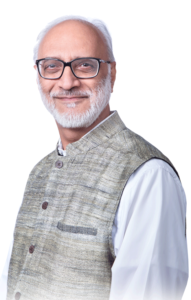

2016 Conference: Ashok Gulati
WASTE NOT, WANT NOT:
The Circular Economy to Food Security
29-30 August 2016, Canberra

| Conference Home Topic Overview Conference Invitation Conference Program Speakers’ Bios & Abstracts Sir John Crawford Address Fees & Registration Conference Scholars Conference Sponsors Conference Media |
Conference SpeakersProfessor Ashok Gulati
Dr Gulati has been deeply involved in agri-policy analysis and advice in India. He has been a member of the Prime Minister’s Economic Advisory Council; a member of the State Planning Board of Karnataka; and a member of the Economic Advisory Committee of the Chief Minister of Andhra Pradesh. During 2014-16, he has been an active member of the High Level Committee set up by the government (NDA-II) to restructure the food management system in the country (known as Shanta Kumar Panel); member of the Task Force set up by the Prime Minister under NITI on Agriculture Sector Reforms; and also Chairing a Committee for Agri-Marketing Reforms in the country. He has been recently awarded Padma Shri by the Government. He has to his credit 13 books on issues related to Asian Agriculture (with a focus on India) from publishers of repute such as Johns Hopkins University Press, Oxford University Press, Mac Millan, Academic Foundation, etc. He has published widely in international and Indian journals, and is a prolific writer in media as well. Innovating to Save on Wastages in Agri-Value ChainsAbstractGlobally, about one-third (approximately 1.3 bn tonnes) of food produced for human consumption every year is either lost or wasted while moving from farm to fork. While in developing countries like India losses occur more from poor supply chains due to poor infrastructure, in developed countries it is wasted at the retail and consumer end due to higher standards or sheer neglect. Apart from leading to lesser food available for all, food loss and wastage entails loss of precious scarce resources—water, land, energy, labour, capital, and adversely affects the environment with greater GHG emissions leading to global warming and climate change. Both sets of countries need to do a lot to transform this situation, and save precious natural resources. Saving the already produced food is much more cost effective and sustainable than to keep producing more and more to rot. This can be done by building strong, efficient, compressed and reliable value chains in developing countries through infrastructural investment, institutional changes and innovation in technology, products, practices and policies. Particularly, the role of packaging at the farm level before moving the produce to processing units/wholesalers/retailers needs to be recognized in a country like India where packaging is minimal and the absence thereof causes qualitative and quantitative food losses. The case in industrialized countries requires better production management, de-emphasizing appearance standards, more explanatory date marking systems and raising awareness among consumers about better buying, cooking and recycling methods—this can save food wastages at the retail and consumer levels. |
 Ashok Gulati is currently Infosys Chair Professor for Agriculture at the Indian Council for Research on International Economic Relations (ICRIER), which he joined in March, 2014. During March 2011-February 2014, he was Chairman of the Commission for Agricultural Costs and Prices (CACP), a body responsible for recommending Minimum Support Prices (MSPs) of 23 important agri-commodities to the Government of India. Prior to this, Dr Gulati was Director at the International Food Policy Research Institute (IFPRI) for more than 10 years (Jan 2001-Feb 2011). Before joining IFPRI, he also served as NABARD Chair Professor at the Institute of Economic Growth, and Chief Economist at the National Council of Applied Economics Research in India. He has his MA and PhD in Economics from the Delhi School of Economics (India).
Ashok Gulati is currently Infosys Chair Professor for Agriculture at the Indian Council for Research on International Economic Relations (ICRIER), which he joined in March, 2014. During March 2011-February 2014, he was Chairman of the Commission for Agricultural Costs and Prices (CACP), a body responsible for recommending Minimum Support Prices (MSPs) of 23 important agri-commodities to the Government of India. Prior to this, Dr Gulati was Director at the International Food Policy Research Institute (IFPRI) for more than 10 years (Jan 2001-Feb 2011). Before joining IFPRI, he also served as NABARD Chair Professor at the Institute of Economic Growth, and Chief Economist at the National Council of Applied Economics Research in India. He has his MA and PhD in Economics from the Delhi School of Economics (India).